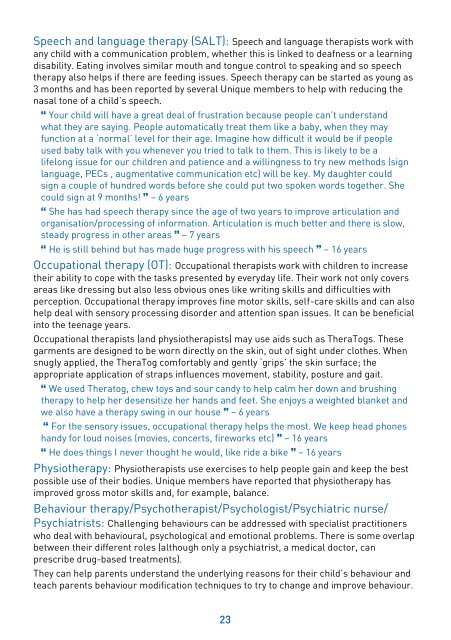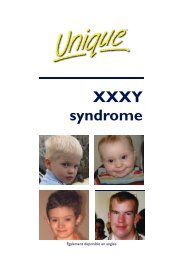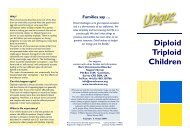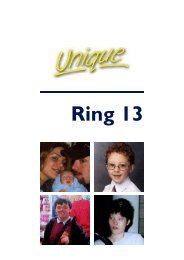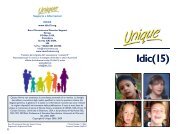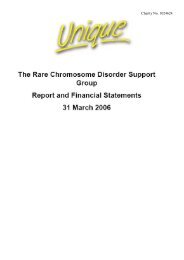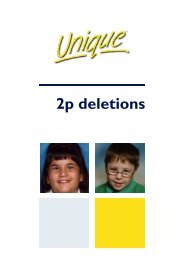19p13.2 microdeletions - Unique The Rare Chromosome Disorder ...
19p13.2 microdeletions - Unique The Rare Chromosome Disorder ...
19p13.2 microdeletions - Unique The Rare Chromosome Disorder ...
Create successful ePaper yourself
Turn your PDF publications into a flip-book with our unique Google optimized e-Paper software.
Speech and language therapy (SALT): Speech and language therapists work with<br />
any child with a communication problem, whether this is linked to deafness or a learning<br />
disability. Eating involves similar mouth and tongue control to speaking and so speech<br />
therapy also helps if there are feeding issues. Speech therapy can be started as young as<br />
3 months and has been reported by several <strong>Unique</strong> members to help with reducing the<br />
nasal tone of a child’s speech.<br />
Your child will have a great deal of frustration because people can’t understand<br />
what they are saying. People automatically treat them like a baby, when they may<br />
function at a ‘normal’ level for their age. Imagine how difficult it would be if people<br />
used baby talk with you whenever you tried to talk to them. This is likely to be a<br />
lifelong issue for our children and patience and a willingness to try new methods (sign<br />
language, PECs , augmentative communication etc) will be key. My daughter could<br />
sign a couple of hundred words before she could put two spoken words together. She<br />
could sign at 9 months! – 6 years<br />
She has had speech therapy since the age of two years to improve articulation and<br />
organisation/processing of information. Articulation is much better and there is slow,<br />
steady progress in other areas – 7 years<br />
He is still behind but has made huge progress with his speech – 16 years<br />
Occupational therapy (OT): Occupational therapists work with children to increase<br />
their ability to cope with the tasks presented by everyday life. <strong>The</strong>ir work not only covers<br />
areas like dressing but also less obvious ones like writing skills and difficulties with<br />
perception. Occupational therapy improves fine motor skills, self-care skills and can also<br />
help deal with sensory processing disorder and attention span issues. It can be beneficial<br />
into the teenage years.<br />
Occupational therapists (and physiotherapists) may use aids such as <strong>The</strong>raTogs. <strong>The</strong>se<br />
garments are designed to be worn directly on the skin, out of sight under clothes. When<br />
snugly applied, the <strong>The</strong>raTog comfortably and gently ‘grips’ the skin surface; the<br />
appropriate application of straps influences movement, stability, posture and gait.<br />
We used <strong>The</strong>ratog, chew toys and sour candy to help calm her down and brushing<br />
therapy to help her desensitize her hands and feet. She enjoys a weighted blanket and<br />
we also have a therapy swing in our house – 6 years<br />
For the sensory issues, occupational therapy helps the most. We keep head phones<br />
handy for loud noises (movies, concerts, fireworks etc) – 16 years<br />
He does things I never thought he would, like ride a bike – 16 years<br />
Physiotherapy: Physiotherapists use exercises to help people gain and keep the best<br />
possible use of their bodies. <strong>Unique</strong> members have reported that physiotherapy has<br />
improved gross motor skills and, for example, balance.<br />
Behaviour therapy/Psychotherapist/Psychologist/Psychiatric nurse/<br />
Psychiatrists: Challenging behaviours can be addressed with specialist practitioners<br />
who deal with behavioural, psychological and emotional problems. <strong>The</strong>re is some overlap<br />
between their different roles (although only a psychiatrist, a medical doctor, can<br />
prescribe drug-based treatments).<br />
<strong>The</strong>y can help parents understand the underlying reasons for their child’s behaviour and<br />
teach parents behaviour modification techniques to try to change and improve behaviour.<br />
23


